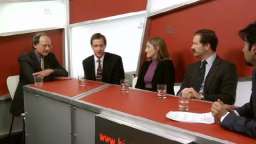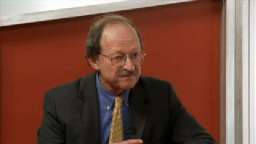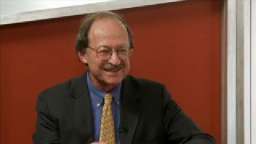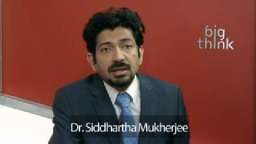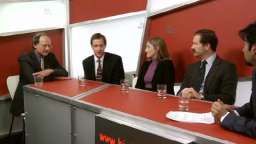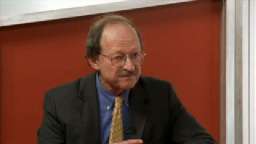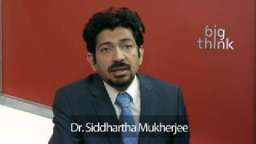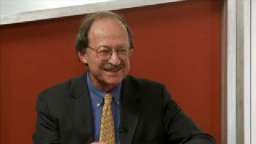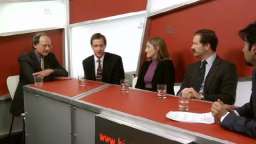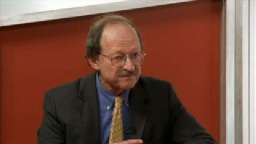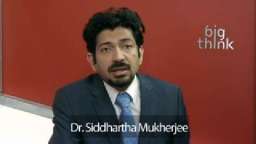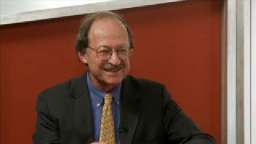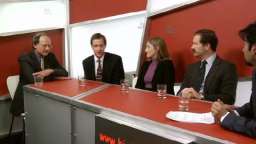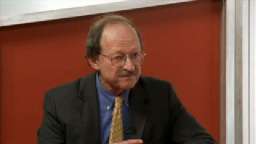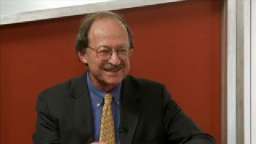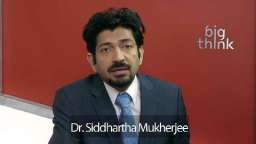All Videos
All Stories
Deborah Schrag: A panel discussion highlighting cutting-edge cancer research.
▸
47 min
—
with
The previous director of the National Cancer Institute wanted to banish suffering and death from cancer by 2015. Current director Harold Varmus says this claim was not based on reality, […]
▸
5 min
—
with
Seemingly every year there are new reports that something we consume or use on a daily basis is carcinogenic. But what exactly does that mean on a biological level?
▸
4 min
—
with
The Cancer Genome Atlas project, already several years underway, is transforming the way scientists think about and treat cancer.
▸
8 min
—
with
There are some dramatic cases in which cancers have regressed or gone away on their own, which raises the bigger question of why some early cancers progress and others don’t.
▸
8 min
—
with
A panel discussion highlighting cutting-edge cancer research.
▸
47 min
—
with
One in three Americans are diagnosed in their lifetime with cancer, a derangement of normal cell growth in which cells grow in antisocial ways, crossing natural tissue boundaries.
▸
6 min
—
with
Deborah Schrag: Why do virtually all men over the age of 90 develop some amount of prostate cancer whereas heart cancer is practically unheard of?
▸
4 min
—
with
The previous director of the National Cancer Institute wanted to banish suffering and death from cancer by 2015. Current director Harold Varmus says this claim was not based on reality, […]
▸
5 min
—
with
Breakthroughs: Cancer, the third in a three-part Big Think series on the major diseases of our time.
▸
47 min
—
with
Seemingly every year there are new reports that something we consume or use on a daily basis is carcinogenic. But what exactly does that mean on a biological level?
▸
4 min
—
with
The Cancer Genome Atlas project, already several years underway, is transforming the way scientists think about and treat cancer.
▸
8 min
—
with
Siddhartha Mukherjee: Why do virtually all men over the age of 90 develop some amount of prostate cancer whereas heart cancer is practically unheard of?
▸
4 min
—
with
One in three Americans are diagnosed in their lifetime with cancer, a derangement of normal cell growth in which cells grow in antisocial ways, crossing natural tissue boundaries.
▸
6 min
—
with
There are some dramatic cases in which cancers have regressed or gone away on their own, which raises the bigger question of why some early cancers progress and others don’t.
▸
8 min
—
with
The previous director of the National Cancer Institute wanted to banish suffering and death from cancer by 2015. Current director Harold Varmus says this claim was not based on reality, […]
▸
5 min
—
with
Seemingly every year there are new reports that something we consume or use on a daily basis is carcinogenic. But what exactly does that mean on a biological level?
▸
4 min
—
with
The Cancer Genome Atlas project, already several years underway, is transforming the way scientists think about and treat cancer.
▸
8 min
—
with
One in three Americans are diagnosed in their lifetime with cancer, a derangement of normal cell growth in which cells grow in antisocial ways, crossing natural tissue boundaries.
▸
6 min
—
with
There are some dramatic cases in which cancers have regressed or gone away on their own, which raises the bigger question of why some early cancers progress and others don’t.
▸
8 min
—
with
Doug Schwartzentruber: Why do virtually all men over the age of 90 develop some amount of prostate cancer whereas heart cancer is practically unheard of?
▸
4 min
—
with
Lewis Cantley: A panel discussion highlighting cutting-edge cancer research.
▸
47 min
—
with
The previous director of the National Cancer Institute wanted to banish suffering and death from cancer by 2015. Current director Harold Varmus says this claim was not based on reality, […]
▸
5 min
—
with
Seemingly every year there are new reports that something we consume or use on a daily basis is carcinogenic. But what exactly does that mean on a biological level?
▸
4 min
—
with
The Cancer Genome Atlas project, already several years underway, is transforming the way scientists think about and treat cancer.
▸
8 min
—
with
Lewis Cantley: Why do virtually all men over the age of 90 develop some amount of prostate cancer whereas heart cancer is practically unheard of?
▸
4 min
—
with
There are some dramatic cases in which cancers have regressed or gone away on their own, which raises the bigger question of why some early cancers progress and others don’t.
▸
8 min
—
with
One in three Americans are diagnosed in their lifetime with cancer, a derangement of normal cell growth in which cells grow in antisocial ways, crossing natural tissue boundaries.
▸
6 min
—
with
Big Think’s panel discussion highlighting cutting-edge cancer research.
▸
47 min
—
with
The previous director of the National Cancer Institute wanted to banish suffering and death from cancer by 2015. Current director Harold Varmus says this claim was not based on reality, […]
▸
5 min
—
with


